Last month we visited the National Trust's Knightshayes Court, near Tiverton in Devon with the Professional Horticulture Group South West to see progress on the walled kitchen garden. We then went on to see a 'cutting-edge' example of vegetable growing at K S Coles in Wellington. These visits are reported below.
At the end of June we visited Thanet Earth in Kent. This expanding group of glasshouse businesses is already the largest glasshouse area in the UK operating the highest standards of growing. We will report on this visit in a future issue.
On 11 July we are visiting VHB Herbs outside Chichester which produces 14 million pots of fresh herbs each year.
Editor
Visit to Knightshayes Court and K S Coles
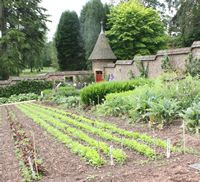
From the First World War onwards the fortunes of the kitchen garden declined as staffing fell to 13 in the 1930s and then to one by 1960 when it was finally abandoned. The solid walls, pictured right, combined with the importance of the garden to the estate led the National Trust to start its restoration.
The whole garden is on a south-facing slope and surrounded by mature trees creating a warm enclosed space with its own distinct microclimate. Above the walled garden is an area of glasshouses and polythene tunnels where the National Trust has maintained its Plant Conservation Programme. However, surrounded as it is by mature trees, the programme and its valuable collection is threatened by the spread of Phytophthora ramorum and so has moved to a new, less threatened site in East Devon.
Head gardener Lorraine Colebrook, showed us round and after explaining the history then showed us what had been achieved thus far. The area is divided into eight segments; four devoted to perennial crops - vines, heritage alliums, asparagus, artichokes and fruit. The remainder enable a rotation of four vegetable plots to be maintained.
These are cultivated organically and the inevitable battle against annual weeds was apparent. They rely on volunteers to undertake much of the cultivation and these are always in short supply when the weeds are growing fastest.
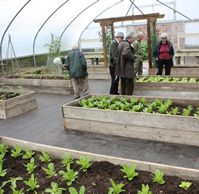
The departure of the Plant Conservation Programme has proved a bonus for her as it has left her with a number of glasshouses and polythene tunnels which have greatly improved both the visitor attraction (see picture right) and the propagation opportunities.
We then moved on to the Chelston House Farm at Wellington, the headquarters of K S Coles - specialist grower and packer of swedes, peas and beans. The business, which has been operating for 42 years, now farms around 4,000 acres of land from Scotland to Cornwall. This diversity of climate and soil enables them to schedule crops to provide product over the longest possible season.
Its primary crop is swede and it produce around 60,000 tons annually. As well as being major suppliers to UK supermarkets is also exports to Germany, Norway, Sweden, Denmark and France. In order to maintain all year round supplies to its customers it has recently installed very accurately controlled chilling rooms to store roots until they are needed. The company is also in the process of moving the swede washing and grading lines into a new facility.
Swede growing and harvesting is highly mechanised, and the main labour input comes in the grading and packaging line to sort the roots for quality and to trim them for sale. In addition to the prepared roots that go straight to the supermarket shelves, swede is also widely used in pasty and pie production.
The other side of the business is growing and marketing fresh peas and beans in their pods. As these are all picked by hand, they are much more labour-intensive crops. Although these can be stored for short periods, Coles has some of the crop grown under contract by selected growers in Spain and Italy to provide the longest season of supply. Nevertheless by a combination of variety selection and improved agronomy the company has been able to extend the home season and reduce their dependence on imports.
The whole operation requires considerable logistical management of both the crops and staff. For example the aim is to pick around ten acres of peas per day. As each crop is only suitable for picking for three days it requires careful scheduling of the crops, which are sown every two days. It is then essential to have the pickers in the field at the right time, to enable the crop to be harvested ready for packing the next day, and be on supermarket shelves the following day.
The whole operation is carefully recorded and monitored to provide the traceability required by customers, and to provide the data to further improve current systems of production.
Plant of the Month
Baptisia australis, blue wild indigo, blue false indigo, Fabaceae
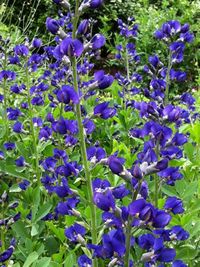
The Latin name may be a little misleading, people often assuming the specific epithet australis to indicate the plant is from Australia. In fact, australis means southern (hence the name for Australia, being in the southern hemisphere) and would indicate that this species of Baptisia is from a more southerly range than others.
Baptisia is a sturdy plant, requiring no staking and easy to grow, typically reaching up to 1m high. Not only does it have eye-catching blue flowers, but later in the season the seed pods are also attractive and have become popular with flower arrangers.
American Indian tribes used this plant for a variety of purposes in addition to its use as a blue dye, including as an eyewash. The roots were made into teas and used as a purgative or for tooth-ache and nausea.
Alison Foster
Oxford Botanic Garden
Medicinal Plant of the Month
Maackia amurensis, Fabaceae
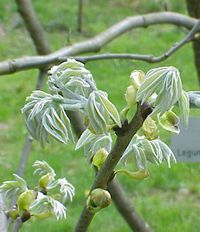
This beautiful tree in the pea family, that comes originally from the Amur river basin. The Amur river is the world's tenth longest river and forms the border between the Russian Far East and north eastern China.
The plant tolerates extremely cold conditions, including frost on the newly emerged leaves and will grow well in cold and heavy soils. It has pinnate leaves that are an almost unreal blue colour when they first emerge in the Spring, but later become a more leaf-like green. In July, a raceme of white flowers opens, prolonging the season of interest of this small to medium tree.
The outer beauty hides the secret of the powerful protein like molecule that occurs in this plant. It is called Maackia amurensis agglutinin (MAA) and is a kind of molecule called a lectin. Lectins are sugar binding proteins that are very specific for the sugar molecules they will bind to. This means they can be used in many different medical applications.
For instance, malignant transformation is known to be associated with changes in cell surface carbohydrate-architecture (the sugar molecules on the surface of cells), which can be detected by lectins. The molecule MAA binds very strongly to lymphoblasts of children who have acute lymphoblastic leukemia (ALL). Therefore, MAA has the potential to be used as a diagnostic and therapeutic agent in the case of childhood-ALL.
A young Maackia amurensis can be seen in the medicinal beds of the Oxford Botanic Garden and the more mature specimen in the dry gardens at the Savill Garden should also be looking great in July.
Alison Foster
Oxford Botanic
Garden
News from our Associates
Commercial Horticultural Association
The CHA is recruiting UK companies interested in exporting for three major trade shows in next few months - HortiFair in Amsterdam (30 Oct - 2 Nov), IPM in Essen (22-25 Jan 2013) and Fruit Logistica (6-8 Feb 2013). Grants of between £1,000 and £1,400 are available to eligible companies. HortiFair focusses on technology, IPM on pot plants and nursery stock while Fruit Logistica, as its name implies is about fruit.

ISHS has released a 70-page report, Harvesting the Sun, that examines how horticulture touches all. Harvesting the Sun traces the farm-to-table journey using simple language and informative graphics. It highlights innovations in crop breeding, production, and handling, presenting recent advances in how to control pests and diseases, promote food safety, and minimise post-harvest losses.
It explores how horticulture offers myriad paths to economic growth, and offers insights into how the cultivation of plants nourishes the spirit as well as the body. Harvesting the Sun brings the benefits of horticultural science to the attention of a wider audience. ISHS hopes that this publication will spark new interest in the people and processes that coax fruits, roots, leaves, and flowers to yield health, wealth, and beauty worldwide.
Horticulture Industry News
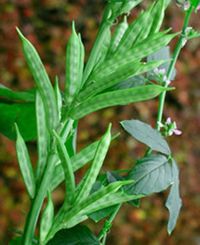
The oilfield services company Halliburton said its North American profit margins would fall by twice as much as expected in the current quarter and blamed a shortage of guar beans, Cyamopsis tetragonoloba. Guar gum is a key ingredient in hydraulic fracturing, or fracking, fluids, which are used to extract natural gas from rocks. It is also used to make ice cream and sauces.
The rising price of the beans, which are mostly grown in India, was also noted in Tate & Lyle's results last month. The increase in fracking, especially in North America, has led to a big increase in demand for the beans.
GM crops 'aid plant neighbours'
GM crops that make their own insecticide also deliver benefits for their conventional plant neighbours, a study in China has concluded. They seem to boost populations
of natural pest-controlling predators, and this effect spills over to non-transgenic crops. But one group critical of GM planting described the effect as a spillover
'problem', not a 'benefit'. Read more on the BBC website and Read more on the Guardian website.
A centre of excellence for research on fresh produce quality
The Natural Resources Institute (NRI) is collaborating with East Malling Research (EMR), to establish a Produce Quality Centre as a centre of excellence for
UK based research on fresh produce quality. Together the two institutes provide a wide range of expertise combined with excellent facilities for post-harvest
research.
The Produce Quality Centre (PQC) will benefit from the expertise and resources of both institutes, bringing together experts in the production, storage, marketing and supply of temperate, tropical and sub-tropical crops.
Expanding access to research publications
The report of the Working Group chaired by Dame Janet Finch published on 18 June recommends a programme of action to enable more people to read and use
the publications arising from research. The report recommends actions which can be taken in the UK which would help to promote much greater and faster
access, while recognising that research and publications are international.
It envisages that several different channels for communicating research results will remain important over the next few years, but recommends a clear policy direction in the UK towards support for open access publishing. This means that publishers receive their revenues from authors rather than readers, and so research articles become freely accessible to everyone immediately upon publication.
At the same time, the report recommends extensions to current licensing arrangements in the higher education, health and other sectors; and it welcomes recent moves by publishers to provide access to the great majority of journals in public libraries.Vitamin C can increase seed production
Biochemists at the University of California, Riverside report a new role for vitamin C in plants: promoting the production of twins and even triplets in plant seeds. They, found that increasing the level of dehydroascorbate reductase (DHAR), a naturally occurring enzyme that recycles vitamin C in plants and animals, increases the level of the vitamin and results in the production of twin and triplet seedlings in a single seed.
Wolbachia amplifies effect of biopesticide
Crop pests such as the African armyworm are a major threat to global food security. Researchers investigating safe, affordable alternative control measures to tackle the caterpillars, such as microbial biopesticides, made an unexpected finding that has opened the door to a new strategy which could multiply the effectiveness of these biopesticides.
In common with nearly three-quarters of all insect species, some African armyworms carry the Wolbachia bacterium. When mosquitoes carry Wolbachia it protects them from viruses including the one which causes the devastating human disease dengue. Wolbachia-carrying mosquitoes have been released in northern Australia, in an attempt to get the bacterium to spread through the local mosquito population and reduce dengue transmission in the area.
However in armyworm, Wolbachia failed to protect them against the viral biopesticide SpexNPV and populations carrying lots of Wolbachia had much higher viral loads and more of these caterpillars died of viral disease.
Kew gardens appoints new director
The Royal Botanic Gardens, Kew, has appointed Richard Deverell to succeed Professor Steve Hopper as director. He will take up his post in mid-September 2012 following Hopper's departure after six years in post. He joins Kew after nearly 20 years at the BBC where he in areas such as BBC News where he ran the news and sport websites and BBC Children's where he was responsible for CBBC and CBeebies.
Koppert strikes Brazil deal
Dutch biological control supplier Koppert Biological Systems has reached an agreement with Brazilian company Itaforte BioProdutos Ltda regarding the takeover
of 100% of Itaforte's share. Itaforte's activities include the production, research into, registration of and marketing of natural, microbiological solutions in combating diseases and pests in the agricultural sector.
The company concentrates primarily on fungal products produced on the basis of Beauveria bassiana, Metarhizium anisopliae and Trichoderma harzianum which are registered for use within the Brazilian market.
New research facility planned at University of Warwick
The University of Warwick has unveiled proposals to build state-of-the-art glasshouses and controlled-environment facilities at its Coventry campus as part of a £5m investment in food security research. The two-storey 1,200m2 Phytobiology Facility, to be completed in 2013, will be used by the university's
School of Life Sciences for research into topics such as resistance to pests and diseases, and how plants cope with environmental stress and plant reproduction.
Merger forms Scotland's first university college
Barony, Elmwood, Oatridge and Scottish Agricultural Colleges (SAC) are to merge to form Scotland's Rural University College (SRUC). It will be the first university college in Scotland in a process that will take a further 12-18 months.
The newly merged college will officially come into existence on 1 August, following approval by Scottish cabinet secretary Mike Russell. Merger Partnership Board chairman Andy Robb said: 'The SRUC will be the first fully integrated tertiary education, research and consultancy institution for the rural and land-based sectors in Europe.'
Canadian biotechnology company Okanagan Specialty Fruits claims to have engineered the world's first non-browning apple. It has filed an application for commercial
growing of the genetically-modified Arctic apple with the Canadian Food Inspection Agency. However, provincial legislature member Lana Popham claimed that the
apples could have an impact on the organic status of nearby orchards and has started a petition against them.
Botanic gardens around the world have signed an historic agreement to restore the world's damaged ecosystems over 20 years. The alliance will respond to the UN ecosystem repair goal, with projects conducted on six continents, using the botanic gardens, arboreta and seed banks. The areas to be targeted include tropical forests, prairies, wild places within cities, wetlands and coastal sites.
UK team plays role in tomato decoding
The genomes of the cultivated tomato and its wild ancestor have been successfully sequenced. More than 300 scientists from 14 countries collaborated on the task, with the UK team led by researchers at Imperial College London and the University of Nottingham, being given one of the 12 chromosomes to decode. I
t is expected to help breeders to identify important tomato genes responsible for flavour, nutrition, disease resistance and other traits, allowing them to deliver new varieties more quickly and efficiently.
Professor Douglas Kell, chief executive of the Biotechnology & Biological Science Research Council, which funded the UK contribution, said: 'Advances are knocking years off the time it takes to sequence even a complicated organism like a tomato plant'.
Study reveals that each family wastes £680 worth of food every year
Vegetables make up the biggest share of the £12bn worth of household food wasted each year, according to latest research by Birds Eye and the government-backed Waste and Resources Action Programme (WRAP). The study showed that fruit and bread make up the next biggest share.
Events Calendar
Woody Ornamentals of the Temperate Zone
1 - 4 Jul, International Society for Horticultural Science
Ghent, Belgium
Symposium on Horticulture in Europe
1 - 5 Jul, International Society for Horticultural Science
Angers, France
Seed, Transplant and Stand Establishment of Horticultural Crops
1 - 5 Jul, International Society for Horticultural Science
Brasilia, Brazil
Improving the Performance of Supply Chains in the Transitional Economies
4 - 7 Jul, International Society for Horticultural Science
Cebu, Philippines
Physical Chemical Properties Of Plant Protection
5 Jul, Chemical Regulations Directorate
York, UK
Nematodes as Environmental Bioindicators
5 - 6 Jul, Association of Applied Biologists
Ghent, Belgium
Computational Fluid Dynamics (CFD) Applications in Agriculture
9 - 12 Jul, International Society for Horticultural Science
Valencia, Spain
Germplasm of Ornamentals
16 - 20 Jul, International Society for Horticultural Science
Beijing, China
Irrigation of Horticultural Crops
16 - 20 Jul, International Society for Horticultural Science
Geisenheim, Germany
Fruit for the Future
19 Jul, James Hutton Institute
Dundee, UK
Fruit Focus
25 Jul, Haymarket Media
East Malling, UK
World Congress of Food Science Technology
5 - 7 Aug, IUFoST
Iguacu, Brazil
Potatoes in Practice
9 Aug, James Hutton Institute
Dundee, UK
Plantarium
24 - 27 Aug,
Boskoop, The Netherlands
Amenity Arboriculture Conference
2 Sep - 5 Sep, Arboricultural Association
Reading, UK
Ornamental Breeding Worldwide
2 - 5 Sep, International Society for Horticultural Science
Warsaw, Poland
Physics
meets Biology
3 - 5 Sep, Society of Biology
Oxford, UK
Four Oaks
Trade Show
4 - 5 Sep
Lower Withington, UK
Saltex
4 - 6 Sep, Institute of Groundsmanship
Windsor, UK
International
Chestnut Symposium
4 - 8 Sep, International Society for Horticultural Science
Shepherdstown, USA
International People Plant Symposium
6 - 8 Sep, International Society for Horticultural Science
Venlo, The Netherlands
International
Humulus Symposium
9 - 14 Sep, International Society for Horticultural Science
Zatec, Czech Republic
European Microscopy
Congress
16 - 21 Sep, European Microscopy Society
Manchester, UK
GLEE
17 - 19 Sep, i2i Events Group
Birmingham, UK
Postharvest Research,
Education, and Extension
18 - 20 Sep, International Society for Horticultural Science
Bogor, Indonesia
Natural
Products and Biocontrol
19 - 21 Sep, International Biocontrol Manufacturers Association
Perpignan, France
Biological Plant
Protection as the Basis of Agricultural Ecosystem Stabilization
25 - 27 Sep,
Krasnodar, Russia
Olive Growing
25 - 29 Sep, International Society for Horticultural Science
San Juan, Argentina
Macfruit
26 - 28 Sep, Cesena Fiera
Cesena, Italy
South West Growers Show
3 Oct, South West Growers
Exeter, UK
Precision
Farming for Crop Protection
3 Oct, Association of Applied Biologists
Harper Adams, UK
Biopesticide Market Opportunities
5 Oct, University of Greenwich and Natural Resources Institute
Greenwich, UK
Integrated Fruit Production
7 - 12 Oct, International Organisation for Biological &
Integrated Control of Noxious Animals and Plants
Kusadasi, Turkey
Acrylamide, furans and other food-borne contaminants
8 - 9 Oct, Association of Applied Biologists
Munich, Germany
Above Ground - Below Ground Interactions
8 - 10 Oct, British Ecological Society, Biochemical Society and Society for Experimental Biology
London, UK
Medicinal and Nutraceutical Plants
14 - 19 Oct, International Society for Horticultural Science
Aracaju, Brazil
Light in Horticultural Systems
15 - 18 Oct, International Society for Horticultural Science
Wageningen, The Netherland
Advances in Biological Control and IPM
16 - 19 Oct, Association of Applied Biologists
Marston, UK
Postharvest Quality of Ornamental Plants
16 - 19 Oct, International Society for Horticultural Science
Porto de Galinhas, Brazil
Vegetables and Greens
16 - 20 Oct, International Society for Horticultural Science
Yerevan, Armenia
National
Fruit Show
17 - 18 Oct, Marden Fruit Show Society
Marden, UK
International
Symposium on Persimmon
20 - 26 Oct, International Society for Horticultural Science
Guilin City, China
Annual Biocontrol Industry Meeting
22 - 24 Oct, International Biocontrol Manufacturers Association
Lucerne, Switzerland
Saffron Biology and Technology
22 - 24 Oct, International Biocontrol Manufacturers Association
Srinagar, India
BCPC Weed Review 2012
24 Oct, British Crop Protection Council
Peterborough, UK
Horti Fair
30 Oct - 2 Nov
Amsterdam, The Netherlands

